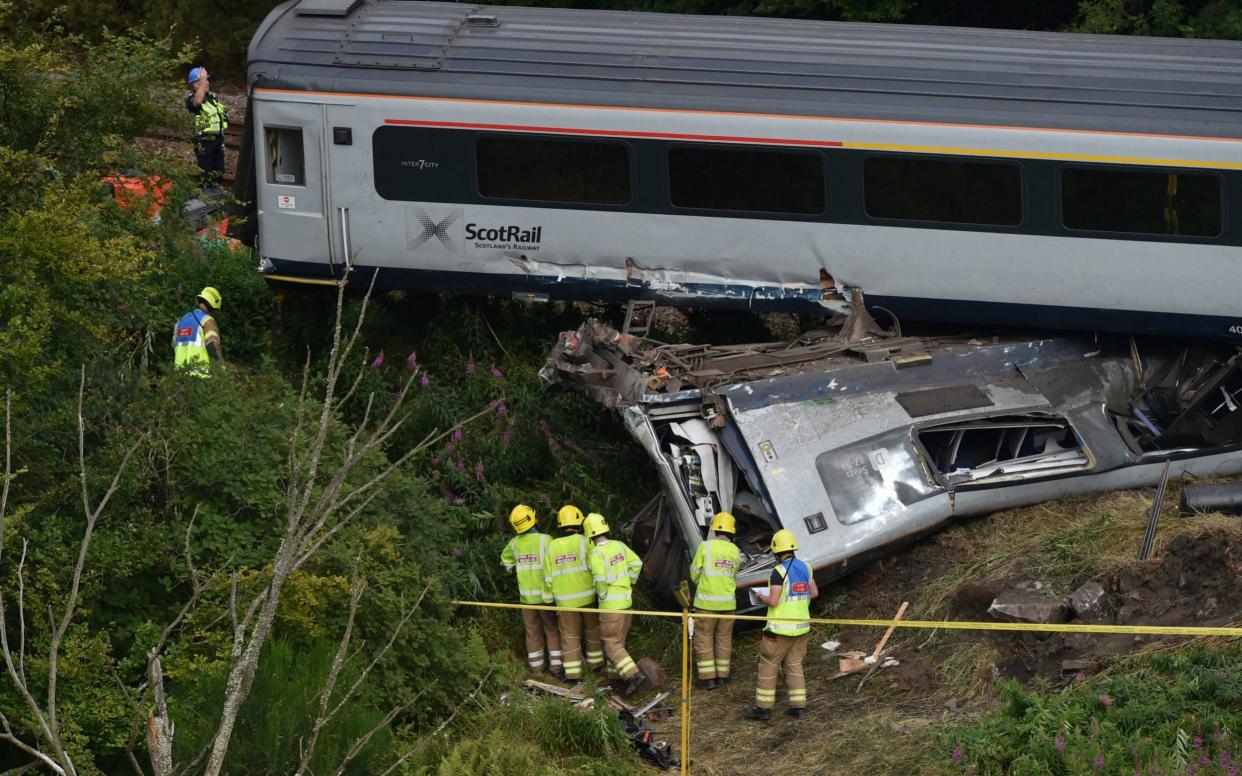Off-duty conductor 'walked a mile' to raise alarm after escaping from fatal train crash

A “determined and courageous” off-duty conductor climbed out of a train wreckage after a derailment in Aberdeenshire left three people dead and walked to a signal box to raise the alarm, it has emerged.
Grant Shapps, the Transport Secretary, visited the site of the deadliest rail disaster in the UK 16 years on Thursday and has ordered an urgent review of high-risk trackside slopes across Britain.
The accident left the train driver, Brett McCullough, conductor Donald Dinnie and a passenger dead. Mr McCullough's family released a statement saying his death had been "utterly devastating", describing him as the "most decent and loving human being we have ever known.
Mr Shapps was taken in a helicopter to survey the scene, which he described as “horrendous”.
There were claims that the conductor who helped raise the alarm by walking to a signal box “walked a mile” to get help. It is believed that the crash happened in a mobile phone black spot.
A member of the public is also believed to have contacted emergency services after seeing smoke billowing from the scene near Stonehaven on Wednesday morning.
“One of the things I’ve asked Network Rail to do immediately in the next few hours and days is to do a very quick resilience check to make sure that there’s no other situation like this,” Mr Shapps told The Daily Telegraph.
“I’ve then ordered an [interim] report from them [to be] on my desk for September 1st, where I want them to check the resilience of the whole of the GB network with this specifically in mind.”
The 6:38am service between Aberdeen and Glasgow Queen St is believed to have hit a landslide at speed as it returned in the direction of Aberdeen, having found the southbound line blocked following a night of storms and torrential downpours.
It remains unclear exactly when the collision occurred, with police not becoming aware of the incident until three hours after the train set off. The train crashed only around 20 miles from Aberdeen, the city it originally left from, with one carriage careering down a steep embankment.
The Secretary of State said there were “obvious questions” about what role the weather played in the tragedy, why the train was heading back north when the accident happened and the speed it was travelling at. He said these would be “left to the professionals” with investigations already well underway.
However, he raised the possibility that climate change, increasing the frequency of extreme weather events, could have been a factor. Boris Johnson said on Wednesday that a month’s worth of rain had fallen in the area in a very short space of time.
“We’re going to have to take a lot of Victorian infrastructure which wasn’t built for this extreme weather necessarily and we’re going to have to upgrade it to be able to withstand the weather,” Mr Shapps said. “But as I say, you might think you know what went on there but the experts will tell you what really happened and we need to understand that before we jump to any conclusions.”
Network Rail said it would use in-house engineers, specialist contractors and helicopter surveys to assess dozens of sites with "similar characteristics" to the remote stretch of railway where the service derailed.
An investigation will reveal whether work to defend against adverse weather needs to be "stepped up", Michael Matheson, the Scottish Transport Secretary who also visited the site, said.
He added that adverse weather was increasingly having an impact on routes and the Rail Accident Investigation Branch (RAIB) probe into the incident would reveal whether mitigation works needed to be increased.
Mr Matheson also paid tribute to the conductor who walked from the wreckage to get help. He said this had allowed the line to be closed immediately afterwards.
He said: "It demonstrates the courage and determination they had to try and deal with the incident as effectively as possible and I’ve already highlighted how I’ve been quite literally humbled the way in which our emergency response teams have dealt with this issue, but also how our network rail engineers and railway engineers have helped to manage this incident over the course of the last 24 hours."
Meanwhile, tributes were paid to Mr McCullough, 45, who was married with three children. Originally from Bromley in Kent, he worked as a gas fitter and his interest in trains began in 2011, when he serviced the boiler of an Aberdeen train driver and struck up a conversation about locomotives. He entered service with Scotrail in December 2013.
In a statement, his family said: “Words cannot describe the utterly devastating effect of Brett’s death on his family and friends. We have lost a wonderful husband, father, and son in the most awful of circumstances. Brett was the most decent and loving human being we have ever known and his passing leaves a huge void in all our lives.”
They added: “We would like to thank the emergency services for their heroic efforts in helping everyone affected by this tragedy and for all the messages of support and condolence we have received.”

